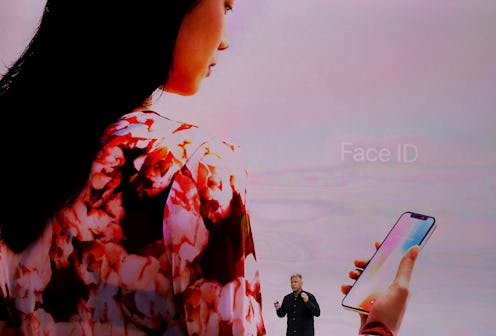
At Tuesday's much-anticipated launch event, Apple unveiled its new iPhone series: the premium iPhone X, along with the iPhone 8 and iPhone 8 Plus. The technology company also revealed that the iPhone X will feature a facial-recognition tool known as Apple's Face ID, something which is making Twitter panic as people contemplate the potential ramifications of having a phone that recognizes their face.
Apple's Face ID feature reportedly works by making a three-dimensional model of one's face. Instead of using a passcode or fingerprint scan, users can hold their handset up to their face and unlock their phones with their visage. Apple noted that Face ID technology will result in a diminished likelihood that someone else can unlock your phone. The company noted that the chances of another person's fingerprint unlocking your phone stand at one in 50,000 ( rare), but that the chances of someone else's face unlocking your phone are ever rarer — one in 1,000,000.
While Apple seems confident that Face ID will enhance phone security, some social media users have concerns about the impact of the technology on their privacy and security, while others have questioned its functionality and usefulness. Twitter was certainly abuzz during and following the launch of the new iPhone series and many users repeatedly brought up similar concerns they had about the implications of Face ID technology.
1. Worries About Police
A substantial number of Twitter users indicated that they were deeply concerned about police or other security officials, like customs agents, being able to easily unlock their phones and infringe on their privacy as a result of the Face ID technology. Users pointed out that it is much easier for a security official to merely hold a phone up to someone's face and unlock it, as opposed to making them reveal a passcode or physically coercing them into unlocking a phone with their fingerprint.
These concerns may indeed be quite valid. As Slate pointed out, legally police cannot force people to reveal their passwords for their phones — and subsequently look through them — without a warrant. However, there is less clarity on whether police can require someone to use their fingerprint to unlock a phone, with some courts ruling that it is legally allowable. As Slate noted, even further questions are likely to arise around the issue of facial recognition, with, Elizabeth Joh, a law professor at UC Davis who specializes in police use of technology, noting on Twitter that police searching phones using Face ID technology constitutes “a criminal procedure question waiting to happen.”
While you reportedly can disable Face ID on your phone, it is likely that many users will choose to embrace the technology, meaning that the criminal procedure question will still be one of extreme importance.
2. Ease Of Use Questions
Many users also expressed concerns about the usability of Face ID, especially after the technology failed to recognize Apple’s senior vice president of software engineering, Craig Federighi's, face during the launch event on Tuesday. While the Face ID technology reportedly recognizes all sides of a user's face, allowing them to unlock their phones from different angles, many on Twitter are concerned that the technology could still cause issues, forcing people to have to repeatedly adjust their faces in order to access their phones.
3. The Public Nature Of A Face
Many users were also confounded by how something that's so publicly visible — your face — can also serve as a security feature. While Apple noted that they designed Face ID to make it nearly impossible for someone to unlock another person's phone with a facial replica, like a photograph or a mask, some users are still seemingly unnerved by the fact that their private information can be accessed with a very public access code, their face, as opposed to a private pin code or fingerprint.
Moreover, as Wired pointed out, in the past researchers have successfully used photographs to reconstruct a three-dimensional model of someone's face and subsequently thwarted facial recognition technology. While this method has not been tested on Apple's Face ID, concerns certainly exist about the accessibility of one's face and how it could affect phone security.
4. Access While Sleeping
Other users were concerned about people, especially their significant others, being able to access their phones while they are asleep by merely scanning their faces. While the concern is understandable, Apple has seemingly already addressed this issue and designed Face ID to only work when someone's eyes are open and looking at the phone — meaning a significant other will not be able to peruse someone's phone while they are slumbering.
5. Fears About Unintended Uses
Finally, other users expressed worries that their facial model could be stolen or used for unintended purposes once it is stored within Apple's system. Fortunately, it seems as though Apple is taking every precaution to ensure the security of people's facial models, including only storing a "hashed version" of facial models on its secure enclave security chip. Hashing means that it would be incredibly difficult to replicate a face from stored data, which should quell some concerns about data theft. Moreover, Apple has also indicated that it will not allow facial recognition data to be stored on the Cloud, which enhances security.
Nonetheless, as The Verge pointed out, Apple does technically have access to all of this data and, if it desired, could potentially use it in ways that users are not expecting, like for retail surveillance, among other purposes.
Overall, many on Twitter clearly have some concerns about the security and functionality of Apple's newly-launched Face ID technology. While Apple has seemingly done quite a bit to try to preemptively mitigate some of these concerns, time will tell whether users embrace the technology or avoid using it due to some of the aforementioned issues.